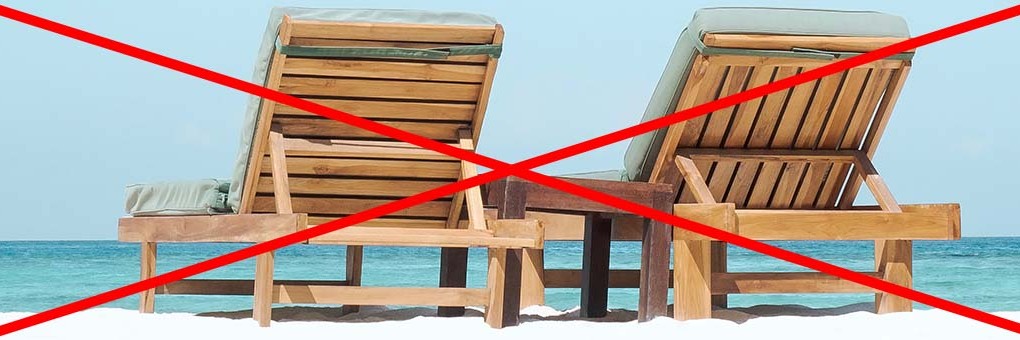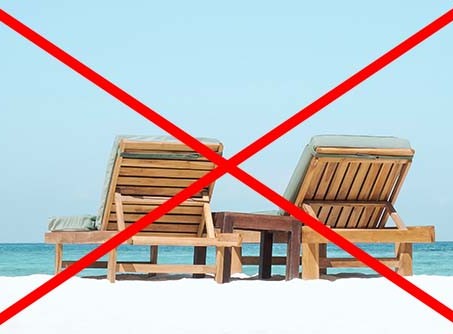Should you accept a voucher if your holiday is cancelled? Or are you entitled to a refund?
A huge number of holidays and flights have had to be cancelled by travel operators and airlines due to the coronavirus crisis. Because of the potential financial impact of handing back all the money owed to customers, many tour operators have decided to issue vouchers rather than cash refunds. Those tour operators who are members of the ANVR (the Dutch Association of Travel Agents and Tour Operators) have been distributing what are known as ‘corona vouchers’ during the current crisis. Many hotels, airlines and tour operators who are not ANVR members have issued their own vouchers. Read on to find out whether you should accept a voucher if you are offered one, and what you need to look out for. An earlier article of mine, entitled Can you get your money back if you cancel your holiday on account of the coronavirus outbreak?, tells you all about your rights should you wish or need to cancel your holiday yourself.
The big question: did you book a package holiday or just a flight or a hotel?
Where vouchers are concerned, there’s a world of difference depending on whether you’ve booked a package holiday or just a flight or hotel. So the first thing you need to do is to be absolutely sure what exactly it is that you have booked – a package or one or more separate elements, such as a flight or hotel accommodation:
- A separate booking is for something like an airline ticket, a ticket for a bus, train or boat journey, or a hotel booking. And the word ‘hotel’ is taken to include all forms of accommodation such as an Airbnb, a holiday cottage, a B&B, a mobile home, a chalet on a holiday park and even a stay in a houseboat.
- A package holiday is a form of product bundling comprising both travel and accommodation. Booking a package holiday means purchasing a number of services, such as travel, accommodation, car hire and other tourist activities, from one and the same tour operator. It’s also important that the package should take up more than 24 hours and should involve at least one night’s stay.
What if you’re offered a corona voucher after your package holiday has been cancelled?
Many tour operators have cancelled their package holidays. Most tour operators who are members of the ANVR and who cancel a package holiday offer their customers a ‘corona voucher’. This entitles you to book a new holiday within a period of one year starting from the date of issue. Should you have accepted the voucher but not go on holiday during the year in question, you retain your right to a refund before the end of the year. Should you wish to obtain a refund before the end of the year, you are entitled to ask for your money back after a period of (at least) six months has elapsed since the date on which you received the voucher.
What if your tour operator goes bust? Are you entitled to a payment from a guarantee fund
It’s always a good idea to make sure, before you accept a corona voucher, whether your tour operator is a member of either the SGR (Travel Compensation Fund) or the GGTO (Guarantee Fund for Specialist Tour Operators). This is because the SGR and the GGTO will pay you the value of your corona voucher if your tour operator is declared bankrupt. If your tour operator is a member of a different guarantee fund, we advise you to take a good look at the terms and conditions applying to the voucher. They should tell you whether the fund will pay out the value of the voucher if your tour operator goes into administration.
Please note that you are entitled to ask for your money back if you don’t wish to accept a corona voucher offered to you by a tour operator. However, many guarantee funds will not cover a situation in which your tour operator goes bankrupt before you have received your money. For this reason, it’s a good idea to get in touch with your tour operator and ask them whether the guarantee fund of which they are a member will pay you the value of the voucher in such an event.
What if you’re offered a corona voucher after a separate booking has been cancelled?
If you have booked just a flight or a hotel rather than a package deal, you are entitled to a refund only if the airline or hotel in question cancels your booking or is unable to deliver the agreed service. This may produce a complicated situation, for example if you have booked a flight and a hotel separately, and the airline cancels your booking but your hotel does not. In that case, you are of course entitled to a refund of the cost of your flight. However, the fact that your flight has been cancelled means that you can no longer make use of your hotel booking. Unfortunately, you are not entitled to a refund from the hotel as the hotel is still able to supply the service you have booked. This means that you will need to cancel your hotel booking yourself. Read about your rights in this case in a previous article of mine, entitled Can you get your money back if you cancel your holiday on account of the coronavirus outbreak?
Please note that, if the airline or hotel offers you a voucher, you are not obliged to accept it if you are entitled to a refund. Clearly, if you are not entitled to a refund, it makes sense to accept a voucher if you are offered one, as you can then use it to pay for a holiday at a later date.
Vouchers offered by airlines and hotels tend to be subject to their own specific terms and conditions. These are not usually the same as those applying to corona vouchers. For this reason, it’s a good idea to read through these terms and conditions before deciding whether the voucher is worth accepting. By finding out in advance what exactly it is that you are accepting, you avoid a dispute with the airline or hotel at a later stage.
If you have booked a stay in a holiday home or a chalet on a holiday park, you may find that the operator or owner in question offers you a HISWA Recron voucher. This will be the case if the operator or owner is a member of the HISWA Recron trade association. Here too, the voucher entitles you to make a new booking within one year of the date of issue. If you decide during the course of the year that you do not wish to make use of the voucher, you remain entitled to a refund until the end of the year. Please note that the HISWA Recron voucher does not apply to bookings for an entire season or a whole year.
What if a voucher comes with unreasonable terms?
What should you do if your tour operator offers you a voucher, but you believe that the terms attached to the use of the voucher are unreasonable? In that case, you can ask the tour operator to modify the terms of the voucher by sending the tour operator a letter or email in which you clearly state:
- when you signed a contract with them, and what the contract was for
- when you were offered a voucher as compensation for a cancellation
- what exactly the problem is. Specify clearly which particular terms you feel are unreasonable and why this is
- what you want the tour operator to do – for example, bring the terms into line with the guidelines laid down by the Netherlands Authority for Consumer and Markets (ACM);
- what action you intend to take if the tour operator fails to offer you a solution. This could mean, for example, reporting the tour operator to the ACM ConsuWijzer (the ACM’s consumer information portal), making a complaint to the Dutch Consumer Complaints Board or taking them to court.
What if a tour operator offers you a voucher, but you would prefer a refund?
If this happens, you should refuse to accept the voucher and ask the tour operator to refund the cost of your trip within a reasonable period of time. You can do this by sending the tour operator a letter or email in which you clearly state:
- when you signed a contract with them, and what the contract was for;
- when you were offered a voucher as compensation for a cancellation;
- what exactly the problem is. State clearly why you do not wish to accept the voucher and that you would prefer to get your money back;
- what you want the tour operator to do, i.e. refund the cost of the trip by transferring the amount concerned to your bank account within a reasonable period of time. What exactly a reasonable period is, tends to vary depending of the circumstances. Before the coronavirus outbreak, 14 days was generally regarded as being a reasonable period. However, in the current circumstances, this may well be seen as being too short. It is possible that four to eight weeks might now be regarded as reasonable. This is a point that you should bear in mind when drafting your letter or email. If you’re in doubt, it’s better to offer the tour operator more rather than less time;
- what action you intend to take if the tour operator fails to refund your money within a reasonable period. This could mean, for example, reporting the tour operator to the ACM ConsuWijzer (the ACM’s consumer information portal), making a complaint to the Dutch Consumer Complaints Board or taking them to court.
What if your tour operator, airline or hotel does not respond?
Many tour operators and other travel companies who offer customers a voucher in lieu of a refund, reject requests for a refund. Indeed, some tour operators seem to have a policy of not responding at all to emails and letters from customers. So what should you do if this happens to you?
First of all, make sure that you give the tour operator a reasonable period in which to refund the cost of the holiday. If the tour operator does not pay (or reply) within the reasonable period you have set, you could then report them to the ACM ConsuWijzer (the ACM’s consumer information portal). If the ACM ConsuWijzer is unable to help, you should generally be able to make a complaint to the Dutch Consumer Complaints Board. In return for a small fee, the Consumer Complaints Board will examine your complaint and arrive at a binding ruling. Both parties are required to abide by the Board’s decision.
Before submitting a complaint to the Consumer Complaints Board, you need to check whether your tour operator is affiliated with the Board. You should be able to find this out by checking the information on the Board’s website and/or by seeing what it says in your tour operator’s terms and conditions. If the tour operator is not affiliated with the Consumer Complaints Board, you could then take them to court.
Any queries about the effects of coronavirus on your holiday plans?
Has your holiday been cancelled? Are you keen to find out whether you are entitled to a voucher or a refund? Is your tour operator not affiliated with the Consumer Complaints Board and would you like to know how you can institute court proceedings against them? Or have you been affected in another way by the coronavirus outbreak? Feel free to get in touch either with me or with our special Coronavirus Help Desk. We’ll be only too pleased to help.





